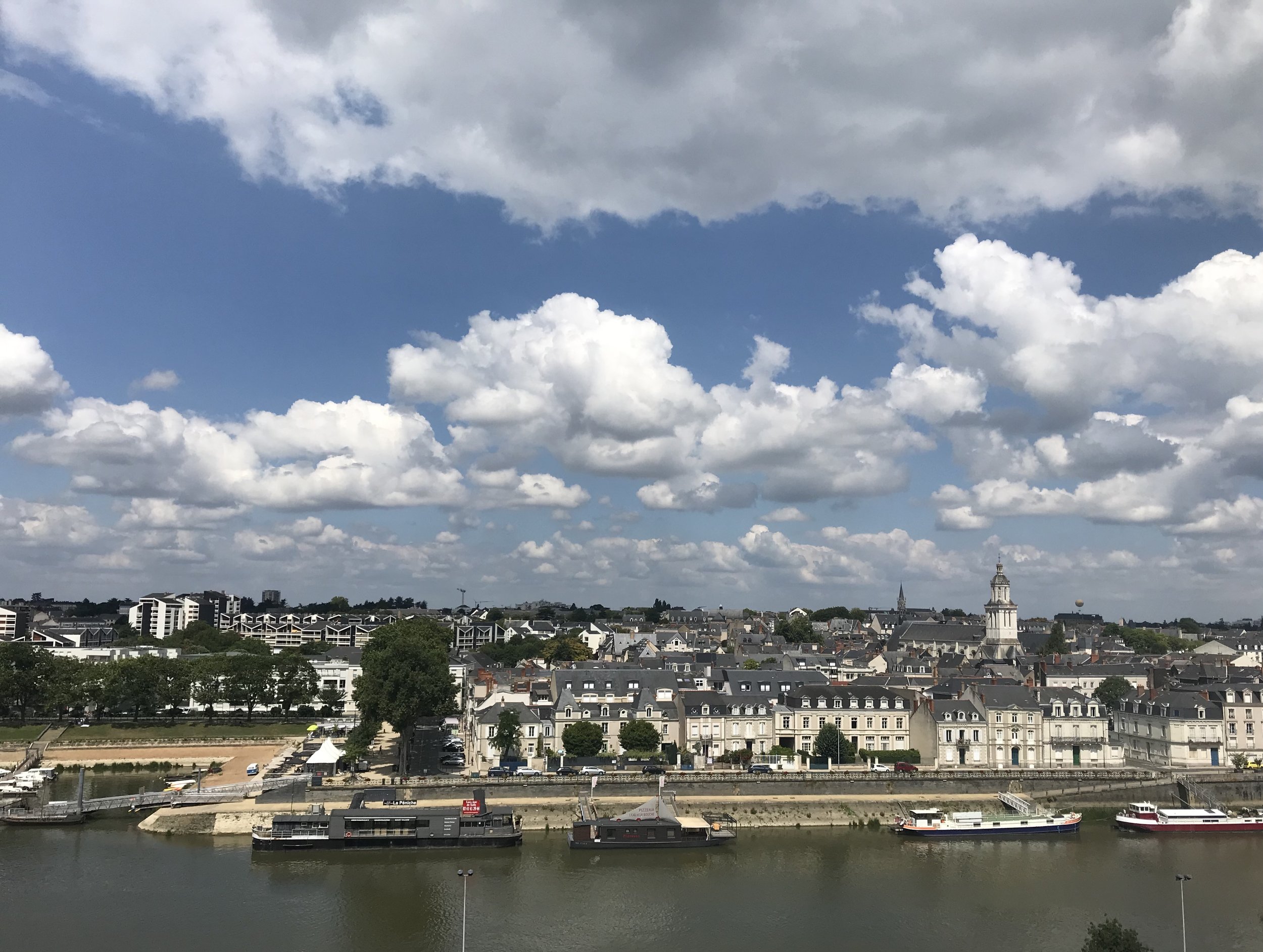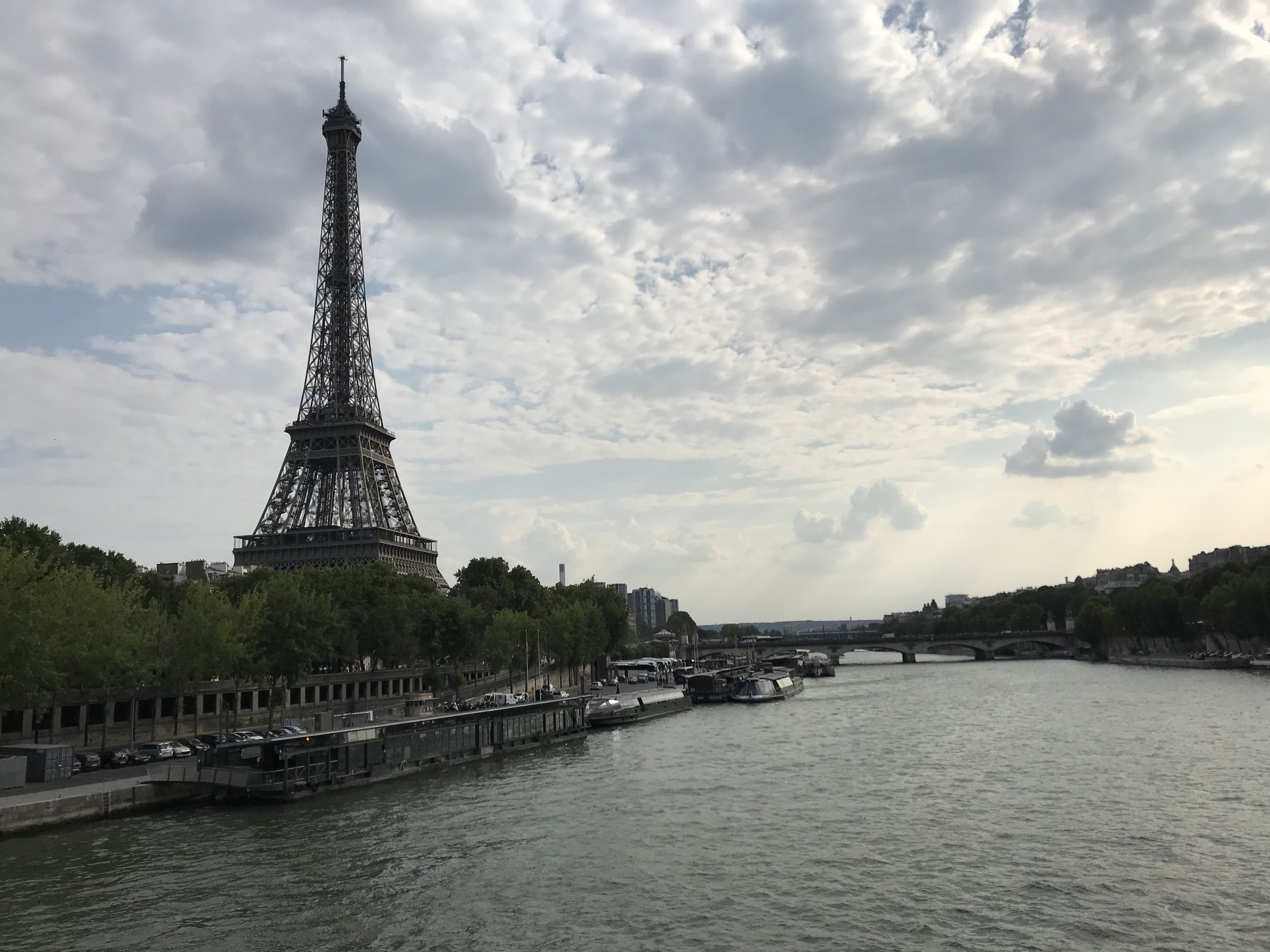The first that I saw a glacier (at least that I was aware of) was in Argentina in late 2010. I was pretty disappointed actually. I didn’t really know what a glacier was – I imagined it as kind of a square version of the iceberg in Titanic, a huge block of ice floating in water. The glacier we visited was part of a park near Bariloche, and wasn’t floating at all, but looked to me like a patch of dirty snow tucked into a mountain crevice.
Argentina glacier
I’ve become much more familiar with glaciers since Argentina, having lived three years in Montana where there is a literal national park named after glaciers! Now I live in the Engadin Valley of Switzerland, another place filled with glaciers present and memories of glaciers past.
It’s hard to complain about the temperature here. Right now, as much of Europe is suffering from unprecedented high temperatures, we’re sitting pretty with highs of around 70-75 and in the evenings it can even be sweater weather. In contrast, I was in Lyon, Angers, and Paris, France a couple of weeks ago and oh my god was it hot. I like to imagine myself as an adaptable person who can handle a little heat – I mean, it is summer after all – but oh man was it hot. By the end of my time in Paris, I felt like my face was just a boiling tomato, red and sweaty and puffing up bigger every minute.
Spending a very hot day in Lyon on the water
Nighttime in Lyon is the right time (because it's not so freaking hot)
Angers - slightly less hot but still very hot
Classic Paris photo (not pictured: my sweaty face)
Sunset over Nanterre, right outside of Paris, which did I mention was so dang hot?
Still, living in a place with glaciers, you can’t really forget that overall, everything is just getting warmer. Glaciers are one of those climate change symbols that are easy to see the differences over time. I mean, I can’t see parts-per-million of CO2 in the air, but I can see a glacier and then look at the nearby placard showing “here is where the glacier was just 15 years ago” with a picture of a glacier double the size.
Sam and I recently got our season passes for the nearby mountains. Really, they’re annual passes, and they’re a pretty amazing deal. You have to be a local resident, which means you have this red piece of paper which, in my case, has the world’s worst passport-sized photo attached. Then, for just $700, you get access from June 1, 2018 – May 31st, 2019 to take chairlifts and gondolas for all the nearby mountain resorts. That’s not just for skiing, but also for hiking. Just for context, a one-day ski ticket costs $80, and a ride up to some of the non-ski mountains costs $35 roundtrip. Anyway, just some exciting information about my privileged life there.
Since Sam and I can take gondolas up to the top of things whenever we want just for the fun of it without having to spend almost $100, we went up to the tippy top of Corvatsch the other day, which happened to be his birthday. The top of Corvatsch is 3303 meters high, which is almost 11,000 feet. From there, you obviously have a pretty decent view of the surrounding mountains, glaciers, and indents in mountains where glaciers used to be. Sam, who had gone up to the top of Corvatsch probably 20 years ago on a school trip, remembers how much bigger the glaciers used to be. And in nearby Pontresina, there is the famous Morteratsch glacier that is now also famously shrinking.
View from Corvatsch where the glaciers used to be bigger
Meanwhile in other parts of Switzerland, it has been so hot and so dry that freshwater fish are dying. Like, a lot of them, especially in the Rhine in the canton of Schaffhausen. The Rhine is obviously a very big river, but in some smaller bodies of water, local officials are fishing the fish out of the water using electric-fanned equipment to move them into cooler waters, a good emergency strategy but definitely stressful to the fish. In other areas, they are trying to cool the water temperature artificially.
I bring this up now because I just read the New York Times’s article (but really novella because it’s quite long) called “Losing Earth: The Decade We Almost Stopped Climate Change” and it’s really quite something. First of all, it’s fun in a depressing way to recognize the names of politicians who’ve been around for decades or recognizing someone’s last name and being like “oh, their kid is important now! Nepotism is yay!” For example, Anne Gorsuch, mother of Neil, Administrator of the Environmental Protection Agency under Reagan with an anti-regulation zeal that would make Scott Pruitt proud. Or the weird kind-of déjà vu (although not really déjà vu for me because I wasn’t alive in 1980) where when Jimmy Carter was president, it seemed like action might be taken but then Reagan got elected and shut it down somewhat (and then kind of un-shut it down, and then George H.W. Bush and team and totally shut it down). Feels a little like the Paris Climate Accords under Obama, only to – surprise! – have Trump become president and shut that down all over again.
The article is a really interesting read. It goes into the states of mind of a lot of people involved at the time. It’s hard to know, even with a better political consensus, how much of the carbon reduction goals really could have been reached. I’ve seen some responses online talking about how, while solar and wind existed at the time, they weren’t as sophisticated as they are now and probably couldn’t have done a good enough job to stop people from burning coal and using gas.
The focus of the article really talked about how the intersection of politics and climate became the climate’s downfall. It’s hard to do much of anything on such a large scale without governments taking the lead. But governments often only focus on things that are popular, or that have easy solutions that they can turn around and be like “look what I did! Money and votes please?”
From the article: “But it wasn’t a political problem. Know how you could tell? Political problems had solutions. And the climate issue had none. Without a solution — an obvious, attainable one — any policy could only fail. No elected politician desired to come within shouting distance of failure. So when it came to the dangers of despoiling our planet beyond the range of habitability, most politicians didn’t see a problem.”
When I worked at my last job doing communications for the IPM Innovation Lab, my boss was telling me about rearing biological control agents in different countries and their level of effectiveness. He was comparing releasing this biological control agents (usually a predator insect or a virus) in different countries, I think between Vietnam and another country I don’t remember. He said it was more successful in Vietnam because their communist government took the reins on the project, made government labs rear these biological control agents, and release them in the fields. In order to be effective, biological control agents need to be adopted by a majority of farmers, otherwise there won’t be enough and the pests in uncontrolled plots of land will win out. In capitalist countries, it’s harder to implement, because private industry might not be interested in taking up the cause of rearing these agents, and government can’t really force farmers to adopt the practice. It’s almost like when it comes to issues of the environment, it’s better to have some kind of environmental dictatorship that makes us do good things and doesn’t have to worry about getting votes (I mean, I’m definitely not advocating for a dictatorship, but obviously capitalist democracies don’t really get environmental stuff done).
The New York Times article tried to end on an optimistic note, but I don’t see it. I’m not a climate modeler or anything close obviously, but I feel like whatever shot there was, we msised it. Because even if tomorrow, everyone turned off their lights and cars and the whole world went back to burning sticks for heat and we never emitted again, the toothpaste can’t go back in the tube as they say. Stuff is alredy happening, and mostly to the most vulnerable people. Even if we stopped emitting tomorrow, sea levels are rising. People in island countries like Kiribati are losing their homes and Rohingya refugees in Bangladesh are getting flooded out of their camps and parts of Africa are becoming desertified and people are fighting thirst and starvation. People are becoming climate refugees and will need to be relocated and it’s really hard to imagine a current global system that will take that on, safer countries that will offer them a place.
Instead of talking about how to deal with the millions of people who are going to suffer in the coming years due to climate change, I feel like we hear more about futuristic technologies like putting tiny particles in the air to reflect the sun and devices capable of taking carbon out of the atmosphere. I mean, I guess I’m glad this stuff exists, but why are we always going for the most complicated solution? Like, we can’t possibly bear to reduce our energy use or materialism even a little bit, but hey, what if we shoot sulfur dioxide into the atmosphere to reflect some of the sunlight coming to Earth instead? Keep it simple, right?
It’s hard to see much hope for the climate at times like this. It’s not like I’m worried for sweet mother earth. I imagine she’ll be fine, she always has been. We’ll pollute ourselves to extinction, suffering a lot in the meantime, and taking a lot of species along with us, and the earth will change like before. New species will emerge over millenia, the climate will continue to change, the earth I imagine will adapt, it always has. But we won’t. And while maybe humans don’t deserve to live one earth considering how we’ve treated it, as always, the poorest will suffer the most and the earliest, and we definitely don’t seem to care.






